Geographic Representation
An Election For History Books
An Election For History Books
Geographic representation achieved, GOP wins
three seats, and several other records set
by Ken Martin
©The Austin Bulldog 2014
Posted Wednesday December 17, 2014 8:28pm
Updated Thursday December 18, 2014 6:21am
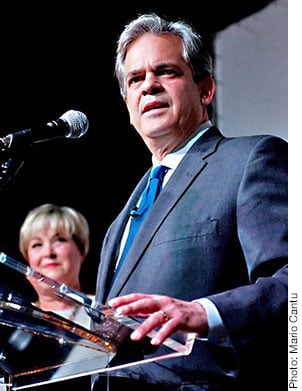 The largest landslide margin ever in an Austin mayoral runoff was achieved last night, as mayoral victor Steve Adler swamped incumbent Council Member Mike Martinez.
The largest landslide margin ever in an Austin mayoral runoff was achieved last night, as mayoral victor Steve Adler swamped incumbent Council Member Mike Martinez.
In Travis and Williamson counties a combined total of 80,669 votes were cast in the mayor’s race. Adler garnered 54,366 for 67.39 percent, while Martinez netted 26,303 for 32.61 percent.
Laura Morrison set the previous record by getting 65.0 percent of the votes in her 2008 runoff against Cid Galindo. Robert Barnstone got 64.98 percent in beating Sam Guzman in a 1988 runoff.
Lee Cooke in 1988 set the prevous record for margin of victory in a mayoral runoff when he got 58.43 percent of the votes to unseat incumbent mayor Frank Cooksey.
 At age 25, Greg Casar became the youngest Austin City Council member ever elected.
At age 25, Greg Casar became the youngest Austin City Council member ever elected.
Previously the youngest council member was 26-year-old Jeff Friedman, elected in 1971.
Friedman’s campaign consultant in that election, Peck Young, verified this, saying, “Jeff was the youngest when he was elected and Greg beats him by a year.” Casar will turn 26 in early May.
Casar ran a smart campaign to soundly defeat now two-time loser Laura Pressley (she got an impressive 44.48 percent of the votes in her one-on-one challenge of incumbent Martinez in 2012).
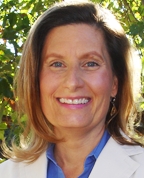 Casar’s District 4 victory of 2,851 votes (64.62 percent) to her 1,561 (35.38 percent) resulted in part from her campaign’s faux pas. Perhaps not the least of which was getting involved in a discussion of the 9-11 attacks being an inside job, which drew intense media coverage, and her latest mail piece attacking Casar for, among other things, allegedly being an atheist.
Casar’s District 4 victory of 2,851 votes (64.62 percent) to her 1,561 (35.38 percent) resulted in part from her campaign’s faux pas. Perhaps not the least of which was getting involved in a discussion of the 9-11 attacks being an inside job, which drew intense media coverage, and her latest mail piece attacking Casar for, among other things, allegedly being an atheist.
Still, last night Pressley couldn’t resist a parting shot. A little after 8pm as early voting results showed she was already behind by more than 700 votes, she insisted on being quoted as saying, “Greg sold District 4 to special interests.”
In response Casar told The Austin Bulldog, “My track record stands up for working people and progressive ideals, even when special interests stood in the way. I’m going to stay committed to that.”
Women rule
What Can Austin Learn From California?
What Can Austin Learn From California?
Panel discussion focuses on how Golden State
experiences inform city’s move to 10-1 council
by Ken Martin
© The Austin Bulldog 2013
Posted Monday, May 6, 2013 2:00am
Updated with video link Tuesday May 7, 2013 10:50am
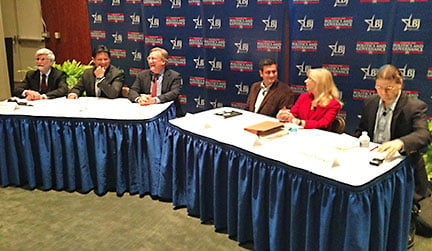 California’s official nickname, The Golden State, adopted in 1968, harkens back to the discovery of gold in 1848. Now the left-coast state’s experiences with using an independent citizens commission to draw maps for 177 seats in four different governing bodies offers a golden opportunity for learning how best to implement the City of Austin’s 10-1 plan.
California’s official nickname, The Golden State, adopted in 1968, harkens back to the discovery of gold in 1848. Now the left-coast state’s experiences with using an independent citizens commission to draw maps for 177 seats in four different governing bodies offers a golden opportunity for learning how best to implement the City of Austin’s 10-1 plan.
The 10-1 plan for electing council members from geographic districts was approved by 60 percent of Austin voters last November 6 who voted for Proposition 3. Work is well underway to establish an Independent Citizens Redistricting Commission (ICRC) that will draw council districts to be implemented in the November 2014 election. The ICRC’s duties are specified in Article II, Section 3 of the Austin City Charter.
Close to a hundred people attended the panel discussion held the evening of Thursday, May 2, at the Bass Lecture Hall on the University of Texas campus. Upwards of half of those raised their hands when asked who had applied to serve on the ICRC.
The event was jointly hosted by UT’s School of Law, the LBJ School’s Center for Politics and Governance, and Austinites for Geographic Representation.
Redistricting Veteran Shares His Wisdom
Redistricting Veteran Shares His Wisdom
Member of California Redistricting Commission
describes what to watch out for in Austin redistricting
by Ken Martin
© The Austin Bulldog 2013
Posted Thursday May 2, 2013 3:55pm
One of the 14 members of the California Redistricting Commission was the featured speaker at today’s luncheon hosted by Austinites for Geographic Representation and sponsored by the Austin Area Research Organization and League of Woman Voters Austin Area.
 Attorney Angelo Ancheta is director of the Katherine and George Alexander Community Law Center and an associate clinical professor at Santa Clara University, where he teaches on subjects including election law, voting rights, and immigration. He came to Austin at his own expense and with no other business here to help educate the community about what to expect going forward.
Attorney Angelo Ancheta is director of the Katherine and George Alexander Community Law Center and an associate clinical professor at Santa Clara University, where he teaches on subjects including election law, voting rights, and immigration. He came to Austin at his own expense and with no other business here to help educate the community about what to expect going forward.
From an applicants’ pool of 30,000 people, Ancheta won a slot on the California Redistricting Commission, the group that drew the maps for four different political jurisdictions, which included 80 seats in the California State Assembly, 40 seats in the California State Senate, 53 seats in the U.S. House of Representatives, and four seats on the California State Board of Equalization.
Ancheta’s experience in drawing maps for California, a state with 38 million people, offers good insights into what lies ahead for the City of Austin and its 845,000 people.
Barrientos Lampoons Prop 4 With a Fable
Other proponents of alternative plans for
geographic representation push their points
by Ken Martin
© The Austin Bulldog 2012
Posted Friday, September 14, 2012 3:07pm
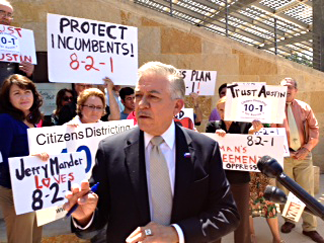 The passion and political experience of retired State Senator Gonzalo Barrientos (D-Austin) lifted the crowd of some 40 interested citizens who had come to hear a debate about what system should govern how Austin City Council members are elected.
The passion and political experience of retired State Senator Gonzalo Barrientos (D-Austin) lifted the crowd of some 40 interested citizens who had come to hear a debate about what system should govern how Austin City Council members are elected.Scene: A debate forum hosted by Southwest Key’s VOTA! Campaign at the organization’s headquarters in far East Austin.
Enter Barrientos: arriving 20 minutes after the program started and a bit flustered from being stuck in traffic.
When his turn to speak came, the former lawmaker drew on his storytelling ability to attack the council’s action to put the 8-2-1 plan (Proposition 4) on the same ballot with the citizens’ 10-1 initiative (Proposition 3).
“In the time of Christ,” he said, “there were two stores on the opposite side of a street. The owners didn’t like each other.
Proposition 3 Advocates Falsely Slam RECA
Proposition 3 Advocates Falsely Accuse RECA
Group alleges ‘rumor’ of $100,000 pledge by Real Estate
Council to defeat Proposition 3, but RECA says not so
by Ken Martin
© The Austin Bulldog 2012
Posted Wednesday, September 12, 2012 10:25pm
An e-mail received early this morning from Austinites for Geographic Representation (AGR), that was titled "A Very Stinky Rumor" turned out to be stinky indeed—as in false.
Or so says the Real Estate Council of Austin.
The AGR e-mail stated, "Rumors are flying that large real estate investors at the Real Estate Council of Austin (RECA) just pledged $100,000 to stop Prop 3—the people's plan for geographic representation—by running a confusion game with Prop 4."
No-Change Option Surfaces in Ballot Debate
Former Council Member Bob Binder opposes both
options on the ballot for geographic representation
by Ken Martin
© The Austin Bulldog 2012
Posted Tuesday, September 11, 2012 2:41pm
Monday's lunchtime debate drew about 40 people to hear arguments for not just Propositions 3 and 4 on the November 6 ballot, but reasons why voters should once again turn thumbs down to both plans for geographic representation in City Council elections.
 The program was hosted by the Central Texas Democratic Forum, emceed by attorney Chuck Herring of Herring & Irwin LLP.
The program was hosted by the Central Texas Democratic Forum, emceed by attorney Chuck Herring of Herring & Irwin LLP.
Until this debate, virtually all discussions about how council members should be elected have focused on the problems with the current all-at-large system and advocated for one of two proposed plans for change.
The Election Wars Have Begun
Interest in how council members elected
running high, as face-off debates abound
by Ken Martin
©The Austin Bulldog 2012
Posted Sunday, September 9, 2012 9:01pm
If you're concerned with how your local city government officials get elected—and how any change in the election system might affect your interests—you will have numerous opportunities to hear a thorough airing of the issues.
Two propositions on the city’s November 6 ballot offer choices for getting away from the all-at-large system we've had since 1953, when the council had five places and the elected council members chose the mayor from among their ranks. The council was expanded to seven places beginning with the 1969 election but it wasn’t until 1971 that citizens could directly elect their mayor.
Today, there are some who advocate keeping the election system we’ve got. However, the two major factions striving for change both advocate a new system of electing council members.
How to change is where they differ.
Your Guide to Proposed City Charter Amendments
What’s on the ballot, how much it will cost taxpayers, and
by Ken Martin
© The Austin Bulldog
Posted Thursday August 30, 2012 8:20pm
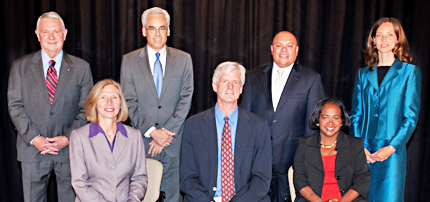 When Austin voters go to the polls starting October 22 for the November 6 general election, they’ll be faced with a potentially bewildering 18 propositions on the City of Austin’s portion of the ballot.
When Austin voters go to the polls starting October 22 for the November 6 general election, they’ll be faced with a potentially bewildering 18 propositions on the City of Austin’s portion of the ballot.
And voters won’t see those propositions until they’ve finished wading through voting for federal, state and local candidates, and deciding whether to support Central Health’s proposed 5 cent tax hike to help fund a new medical school in Austin.
The Austin City Council and a number of citizens are really, really hoping voters don’t just vote a straight party ticket and go home. At stake are $385 million in seven bond propositions, 10 separate proposals to change the City Charter, and one proposition to allow emergency medical personnel to get the same civil service protections as police and firefighters.
Other down-ballot taxing jurisdictions on the ballot are also hoping to keep the voters attention long enough to mark the entire ballot, including Austin Independent School District, Austin Community College, and a bunch more.
In an effort to de-mystify the Austin portion of the ballot, The Austin Bulldog is providing the exact ballot language for each of the 10 propositions involving charter amendments and the emergency medical services proposition, and links to the ordinances that placed each of those on the ballot.







